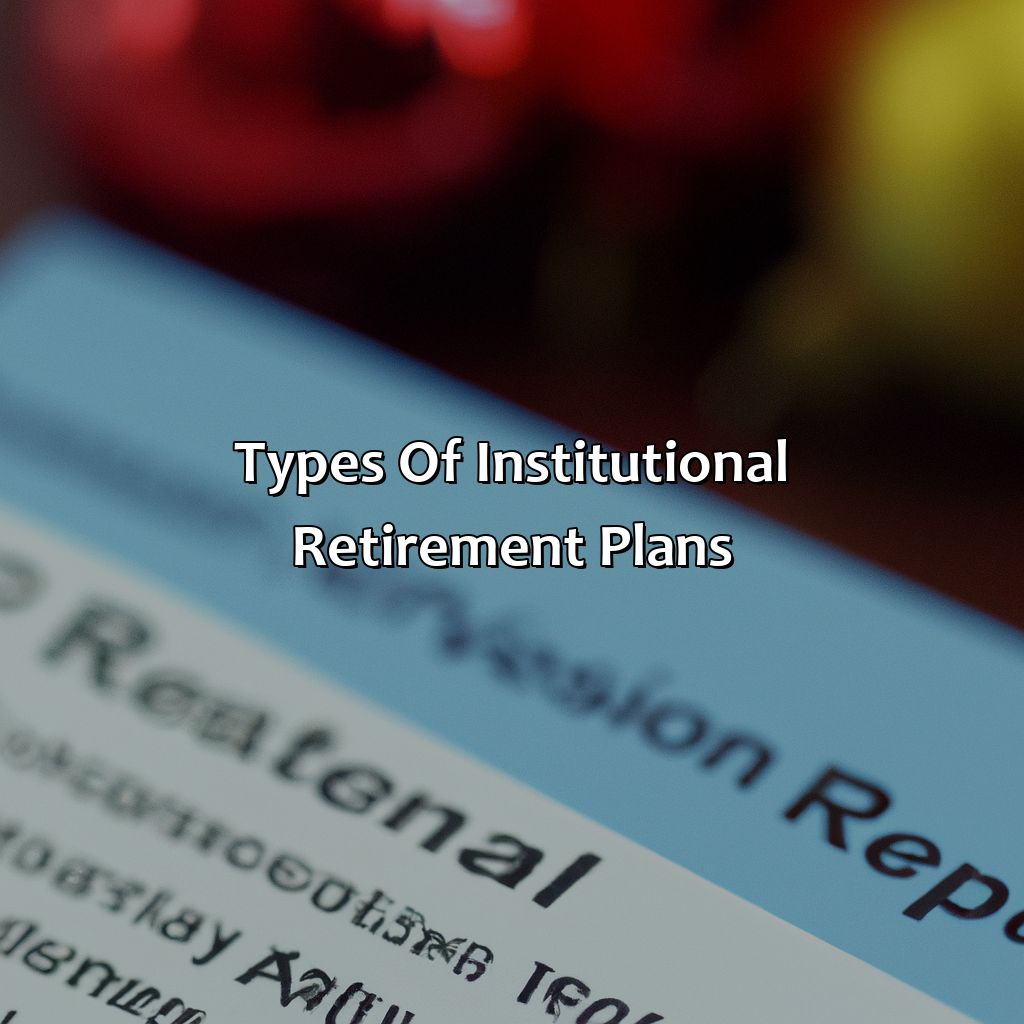What Is Institutional Retirement?
Key Takeaway:
- Institutional retirement refers to retirement plans offered by organizations and entities, such as corporations, governments, and non-profit organizations, to their employees or members as part of their compensation package. These plans are designed to help individuals save money for their retirement and reduce their reliance on government-provided retirement benefits.
- There are two main types of institutional retirement plans: defined benefit plans and defined contribution plans. Defined benefit plans provide employees with a predetermined retirement benefit based on factors such as their salary history and years of service, while defined contribution plans allow employees to contribute a portion of their salary to an account that is invested for their retirement and offer potential tax benefits.
- The advantages of institutional retirement plans include providing employees with long-term financial security and tax benefits for both employers and employees. However, these plans can have drawbacks, such as limited investment options and the potential for mismanagement. When choosing an institutional retirement plan, companies should consider their goals and objectives, employee needs and preferences, and budget constraints.
Are you confused about institutional retirement planning? Get an overview on how institutional retirement plans work and the importance of planning for your future in this article. You’ll learn the types of retirement plans available and how they can help ensure your financial security.
Definition of Institutional Retirement
Institutional Retirement refers to a retirement plan offered by an employer, such as a company or a government entity, to its employees. These plans typically include a range of investment options and are designed to provide retirement income for employees, either through a defined benefit plan or a defined contribution plan. These plans are subject to various regulatory requirements and can differ greatly in their features and benefits.
To participate in an institutional retirement plan, employees typically need to meet certain eligibility requirements, which may include age, length of service, or job status. Once enrolled, employees may be required to contribute a certain percentage of their salary to the plan, while the employer may also contribute funds on behalf of the employee.
While institutional retirement plans can provide significant benefits to employees, they can also be complex and difficult to navigate. Employees may need to make important decisions about their investments and retirement savings, and may need to consult with financial advisors or other professionals to ensure they are making the best choices for their retirement.
In a real-life example, John worked for a company for 20 years and participated in their institutional retirement plan. He was able to build a significant retirement nest egg, thanks to the company’s generous matching contributions and the professional guidance he received from his financial advisor. John was able to retire comfortably and enjoy his golden years thanks to the benefits of his employer’s institutional retirement plan.

Image credits: retiregenz.com by Joel Duncun
Types of Institutional Retirement Plans
Institutional Retirement Plans: A Comprehensive Overview
Institutional Retirement Plans are employer-sponsored retirement plans made available to employees as a part of their benefits package. These plans are tailored to suit the retirement needs of employees based on their income, age and specific needs. Here are some types of Institutional Retirement Plans:
| Plan Type | Description |
|---|---|
| Defined Benefit Plans | Guaranteed payout at retirement based on a formula calculated on factors such as years of service and earnings |
| Defined Contribution Plans | Employer makes contributions to the account based on a percentage of employee’s salary with options like 401(k), 403(b) or 457(b). |
| Employee Stock Ownership Plans (ESOPs) | Employees receive stocks of the company as a part of their retirement plan |
In addition to these plans, there are other offerings such as Cash Balance Pension Plans, Profit-Sharing Plans, and Non-Qualified Deferred Compensation Plans. It is important to remember that each plan has its own set of rules and regulations, and a financial advisor should be consulted for personalized advice.
Pro Tip: When choosing a retirement plan, consider factors such as vesting period, matching contributions, investment options, fees, and tax implications. A carefully thought-out plan can greatly enhance retirement security.
In summary, Institutional Retirement Plans are designed to fit different employee profiles and preferences. From Defined Benefit Plans to Defined Contribution Plans and ESOPs, each plan offers unique benefits. However, it is important to carefully evaluate each plan and consult with a financial advisor to ensure that it best suits individual needs.

Image credits: retiregenz.com by Adam Arnold
Advantages and Disadvantages of Institutional Retirement Plans
Institutional Retirement Plans – Pros and Cons
Institutional Retirement Plans provide benefits for both employees and employers. Here are some of their advantages and disadvantages:
- Advantages:
- Tax Benefits: Contributions to these plans are tax-deductible, reducing the taxable income.
- Employer Matching: Employers often match a percentage of their employees’ contributions to the plan.
- Investment Options: Retirement plans offer a variety of investment options with professional management.
- Retirement Security: Institutional plans provide a secure future for employees in their retirement years.
- Cost-Effective: These plans are cost-effective for employers as they can pool and invest employee contributions.
- Automatic Savings: Enrolling in these plans make saving for retirement an automatic process for employees which may improve their financial habits.
- Disadvantages:
- Restricted Access: Withdrawals from these plans before the retirement age are subject to penalties and taxes.
- No Guarantees: The returns on investments are not guaranteed, and the value of the plan can fluctuate with market conditions.
- Administrative Complications: These plans require administrative work to maintain and may involve additional costs.
- Plan Limitations: Employers can limit employee contributions or investment options, which may not be suitable for all employees.
- Delay in Vesting: The plan may have a vesting period requirement, meaning the employee must wait for a certain length of time to be fully vested.
- Rollover Requirements: When changing jobs, employees may need to move their funds to a new plan or an Individual Retirement Account (IRA) within a specific time frame.
It is essential to carefully consider the advantages and disadvantages of institutional retirement plans before enrolling. While such plans offer a secure future for retirement and tax benefits, there are limitations and potential complications to be aware of. Employees should analyze their financial situation, investment objectives, and goals to assess if these plans align with their needs. Employers must select a plan with competitive fees and the best investment options and balance the plan’s benefits with the anticipated administrative and legal costs.

Image credits: retiregenz.com by Adam Washington
Factors to Consider When Choosing an Institutional Retirement Plan
Institutional Retirement Plans – Factors to Consider
Choosing the right institutional retirement plan can be a daunting task for many individuals. As your retirement years approach, it’s important to consider various factors that can impact your overall financial security. Here are some key points to keep in mind while selecting an institutional retirement plan:
- Investment Options: Assess the range and quality of investment options offered by the retirement plan. Look for diversification options that lower overall risk and provide suitable returns based on your investment goals.
- Fees and Expenses: Evaluate the fees and expenses associated with the plan. Determine if the fees charged align with services provided and compare expenses across different retirement plans before selecting one.
- Employer Contributions: Consider the extent of employer contributions towards the retirement plan. These contributions can significantly impact the overall growth of your retirement savings.
- Plan Flexibility and Benefits: Review the plan’s terms and conditions for withdrawing funds, plan transfer options, and any additional benefits offered through the retirement plan.
It is important to note that comprehensive understanding of a retirement plan is crucial before committing to it. Detailing with an advisor is advisable to make an informed decision.
Considerations for a Secure Retirement
When planning for retirement, there are several additional factors to consider that can impact the success of your retirement plan. Some of these factors include:
- Retirement Age: Determine the right age to retire to maximize returns on your investments with a longer retirement duration.
- Living Expenses: Project the expenses you will incur during your retirement years and adjust your investment strategy to cater to these requirements.
- Health and Long-Term Care: Consider the potential impact of healthcare costs and long-term care during your retirement years. It’s essential to factor in these costs while planning.
- Tax Implications: Evaluate the tax implications of your investment strategy and assess the impact on your overall returns.
By incorporating these considerations, you can increase the chances of achieving a secure retirement. Remember, planning early and seeking out professional advice can further help in making choices in the right direction.

Image credits: retiregenz.com by Joel Duncun
Five Well-Known Facts About Institutional Retirement:
- ✅ Institutional retirement refers to retirement plans established by employers or other organizations to provide retirement benefits for their employees or members. (Source: Investopedia)
- ✅ Common types of institutional retirement plans include defined benefit plans, defined contribution plans, and cash balance plans. (Source: The Balance)
- ✅ Institutional retirement plans offer tax advantages to both employers and employees. (Source: IRS)
- ✅ Institutions that offer retirement plans have a fiduciary duty to act in the best interest of plan participants. (Source: Department of Labor)
- ✅ Institutional retirement plans are subject to government regulations, such as the Employee Retirement Income Security Act (ERISA), to ensure they are operated fairly and responsibly. (Source: Fidelity)
FAQs about What Is Institutional Retirement?
What is institutional retirement?
Institutional retirement refers to retirement plans offered by institutions such as corporations, governmental entities, and non-profit organizations to provide retirement benefits to their employees.
What types of institutional retirement plans are available?
The most common types of institutional retirement plans are 401(k) plans, 403(b) plans, pension plans, and deferred compensation plans.
How do institutional retirement plans work?
Institutional retirement plans allow employees to contribute a portion of their salary to a retirement fund. Employers may also contribute to the employee’s retirement fund or match the employee’s contributions.
Why is institutional retirement important?
Institutional retirement plans are an important way for employees to save for retirement. These plans provide tax benefits and the potential for employer contributions, which can help employees save more for retirement.
Who is eligible for institutional retirement plans?
Eligibility for institutional retirement plans varies depending on the plan and the employer. In general, full-time employees who meet certain employment or age requirements are eligible to participate in their employer’s retirement plan.
What are the benefits of institutional retirement plans?
The benefits of institutional retirement plans include tax advantages, the potential for employer contributions, the ability to save for retirement, and the opportunity to invest in a diversified portfolio of assets.





